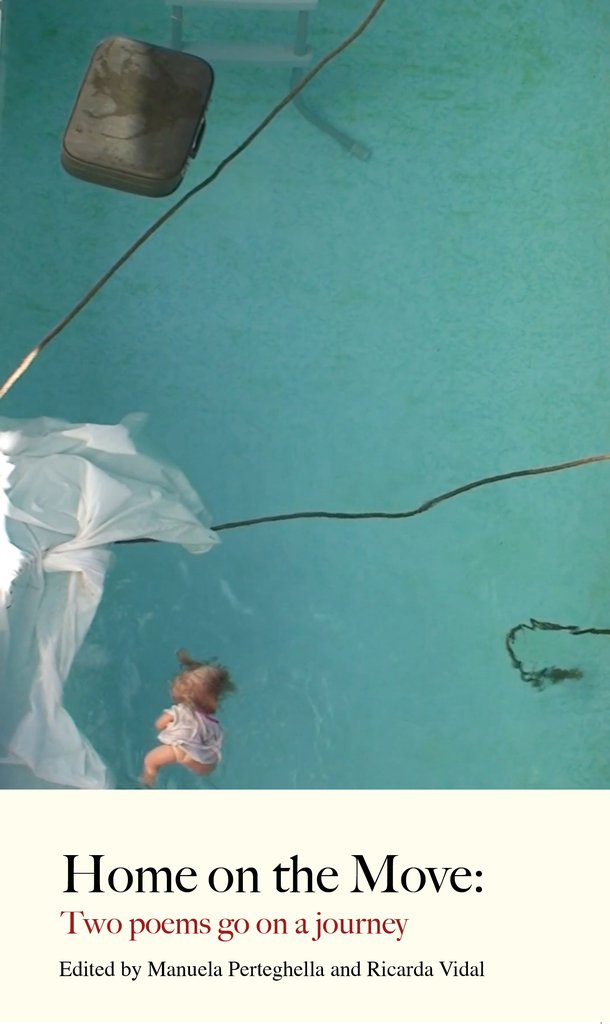search
date/time
 | Yorkshire Times A Voice of the Free Press |

Steve Whitaker
Literary Editor
@stevewh16944270
5:19 PM 12th October 2019
arts
So Many Elsewheres - Home On The Move: Two Poems Go On A Journey

What is fascinating about the premise of this short, interwoven, collection of poems and images is that it does not demand an actual journey; this homage to place is linear only in the sense of a formal progression from one poetic impression to the next. Home on the Move commences with poems about two notional odysseys across Europe – one in the East, one West – conceived, respectively, by Rafal Gawin and Deryn Rees-Jones. Any further ingress is predicated entirely on succeeding translations, each reliant on the preceding poem’s re-calibrated take on the earlier. The notoriously knotty problem of translation is refreshingly subverted by a willingness to see how words act upon each other when the straitjacket of expectation is removed: literal transliterations of words may rupture original meaning, but invest the language of ‘place’ with the vigour of renewed possibility.
Brexit inertia does little to remove the sting of this slim volume’s relevance; its eclectic theatre of words underlines something Europeans share – there is no border between Heimats of the lyrical imagination just as there is no limitation to invention in the free mind. It is no vice to declare a pan-cultural amnesty in these refracted poems, whose strange linguistic crossings are a de facto antidote to populist insularity. That poetic trajectory, here, requires little more than freedom of movement for the imagination underwrites the mind’s hegemony: free to cross figurative frontiers, the words it calls forth are well travelled, precisely as they also signify a feeling for home, if only because the mental path home – to the fabric and context of our lives - is always open.
The title of Home on the Move tells the reader all she needs to know about the mutability of our perception, and about the fundamental transparency of borders. The multinational contributors, each adding accretion to lambent accretion, act as guarantors, preservers of cultural nuances whose words celebrate difference as they add value to an ongoing conversation.
And that dialogue throws up many surprises: translated words whose meaning departs wildly from the original, are liberating to the degree that they fling the windows open to fresh interpretation, even if the notional journey is upended in the process. Why not consider, instead, that the originating poems are now unanchored, set free by their own inherent propensity for change? The journey, as it were, between words opens a mine of new and old meanings which will spark immediate recognition in some whilst bypassing others. There is something, as Kate Clanchy’s diverting Foreword implies, for everyone in the glittering depths:
‘There are many fossils embedded in its rich language banks, and many newly-coined, intensely alive phrases and images too.’

Deryn Rees-Jones
‘We do not want the poems’ journeys to end here, and therefore see this anthology as an invitation to others to continue the linguistic and artistic exploration we have started.’
To absorb the patinas of mutation as the poem(s) progress is to begin to intuit the consanguineous glue that binds Europeans of all stripes. From Deryn Rees-Jones’ ‘HOME’ to Rafal Gawin’s ‘DOM. KONSTRUKCJA W PROCESIE SĄDOWYM’, in his native Polish, we begin to recognise that the respective journeys which follow in translation – from the UK to France and Spain and back, and from Romania to Britain and back – are as transient as an impulse: Rees-Jones’ and Gawin’s poems are no more initiating than points on a continuum; they, too, follow a wider historical arc.
Bearing the character of an echo in an empty room, ‘HOME’ is a masterpiece of distilled inter-spatial, intra-temporal meditation, whose ghostly touch calls forth ‘lost places’ of the imagination, whilst a chimeric narrator flits effortlessly between forgotten spaces and others waiting to be remembered, in the languid pursuit of ‘elsewheres’. Insubstantial, the journey’s totems evanesce, as fleeting as meanings uncircumscribed by borders:
‘To know the world in another language
is to never know the world the same’.
The same might be said of Rafal Gawin’s reflection, whose first translation emerges as ‘HOME. STRUCTURE ON TRIAL’, and whose locators are as conditional, uncertain, protean as a house made of water. Here, fruit tastes of ‘sweet emptiness’, home is a game of hide-and-seek, an ‘occupational accident’, or an insoluble equation. The context of our lives shapes our perception of domiciliary reality, as other contexts will calibrate the ways in which others (mis)perceive us.
The lyricism of the film stills which accompany this groundbreaking volume hold up a mirror to that perception, whether in tone – the soft focus of a still from Zuzanna Janin’s film/translation of Gawin’s poem acts to occlude recognition – or impression: Kate McMillan’s image from The Lost Places, a video/translation of ‘HOME’, is as evocative as a view through winter trees to a far country.
And, if in our sleepwalking we were minded to forget that other country, we are grounded with a jolt by Domingo Martínez Rosario's tragic, and strangely beautiful contemplation of another Europe of seaborne refugees and desperation. The cover image, taken from Rosario’s film translation of Silvia Terrón’s poem, ‘En Casa’, depicts the flotsam of a sunk boat, the suitcases and clothing, and, at the bottom of the still, a baby lying face down in the azure water. The language of home was never more eloquent, ironic, or deafening.
Home on the Move speaks for us all.
Home on the Move: Two Poems go on a journey is published by Parthian Books
More information here: https://www.parthianbooks.com/products/home-on-the-move-two-poems-go-on-a-journey